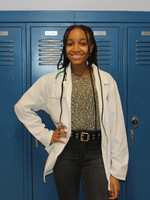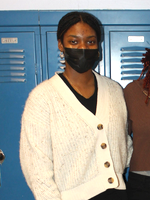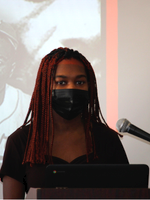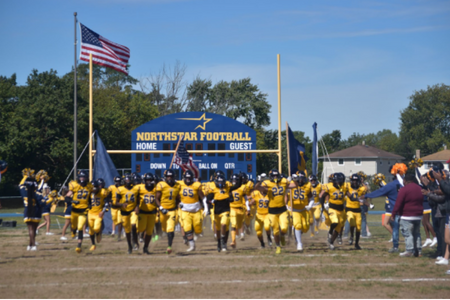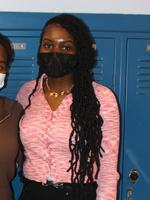Student Interviews
Black History Month Program 2022
How and why did you get involved with the Black History Month program?
Julianna: I got involved in the Black History Month program when I was a freshman, and Ms. Matlack needed someone to fill in because the original person could not make it to the Black History Month presentation that day. Ever since then, I have been doing the Black History Month presentation because I feel as though there is very limited information discussed in history class regarding Black History, and there is so much more to explore. In doing the presentation, I’ve learned so much information myself, and I love sharing some of the untold truths in Black History with others.
Paige: I heard about it on the school announcements.
Jessica: I heard about it over the intercom during the morning announcement and the theme for this year's Black History Program is something that I am very interested in so I decided to get involved.
Nehemie: I have been involved in the annual black history month presentation since my freshman year. I got involved because I wanted to learn more about the untold truths of African American history; this way, I could share what I learned to others. It is important to know history because if you know history, you know yourself. As Mrs.Matlack always says, “no history, no you. KNOW history, KNOW you.”
Kylah: I learned about the program through Mrs. Matlack, I decided to participate because I wanted to learn more about Black Health and Wellness. I felt it was important to educate myself and others about Health and Wellness.
What was the theme of this year’s Black History Month program selected and how was it selected?
Julianna: The theme for this year’s Black History Month program was Black Health and Wellness and it was selected by ASALH (Association for the Study of African American Life and History), which chooses the universal Black History Month topics.
Paige: The year the theme was health care and wellness.
Nehemie: The Nottingham black history month presentation themes are in coordination with ASALH. Their theme for this year was black health and wellness, which is why we presented on that topic.
Kylah: Black Health and Wellness was chosen by the Association for the Study of African American Life and History.
What was the process in creating the program/presentation/posters/PA announcements?
Julianna: The process of creating my Black History Month poster was first by doing research. I looked through numerous websites, videos, and even books my father had given me about Black History. Then I gathered the necessary information and typed it up to be organized on my poster. Then I had to brainstorm a way to make my poster both informative, but also pleasing to the eye. With the help of my creativity and the amazing selection at Michael’s, I found letters for my poster, pipe cleaners and pom-poms to resemble chemical bonds, and I painted red handprints to accentuate the gruesome procedures Black people had undergone.
Paige: There was a lot of researching in the process.
Kylah: I chose a subtopic within the Black Health and wellness topic. I then gathered information and created my Google Slides presentation.
Did you learn anything new, if so, what did you find the most interesting?
Julianna: I learned about many unethical experiments, such as the Tuskegee Syphilis Experiment, the gynecology surgical procedures on enslaved women without anesthesia, and Henrietta Lacks' stolen cells, proving how modern medicine was built on the bloodshed of Black people.
Paige: Yes I learn about the first black woman to become a neurosurgeon. The most interesting thing was That she was the first black women to be enrolled into a internship program at Yale.
Kylah: Yes, I learned many new things like African American folk practices and interesting home remedies. I also learned why African Americans had to turn to this type of treatment due to disparities within the medical health field.
What is an interesting or fun fact about black history that most students probably don’t know?
Julianna: An interesting fact that most students do not know is that the experiments were done on Black people in history still affect how Black people are treated in the medical field today because of racial disparities. These disparities cause black people to fear medical professionals, further justifying why many Black people use naturopathic medicines. Also, many students may be surprised that Central Park was originally Seneca Village, an area completely run by thriving Black Americans.
Paige: Carter Woodson came up with the idea of black history month.
Jessica: Charlotta Bass paved the way for Kamala Harris. In 1948, a journalist named Charlotta Bass became the vice presidential nominee of the Progressive Party, with Vincent Hallinan as her running mate. She was also from Harris’s home state of California!.
Nehemie: One interesting fact about black history that most students do not know is that the statue of liberty was modeled to represent the end of slavery. From an aerial view looking down, there are broken chains amongst the statues' feet.
Kylah: Not every country celebrates Black History Month in February.
Have you/or would you use the methods described in the presentation for black health and wellness in your life? Such as rootwork and home remedies.
Julianna: Along with over-the-counter medicines, I have used numerous home remedies that were discussed in the presentations. During the pandemic, my family would make many detoxes with ginger, pineapple, mint, and spices to eliminate toxins from the body and overall improve the immune system. My family also makes teas like ginger tea and garlic tea whenever we’re sick, so the steam helps clear the sinuses while consuming healthy ingredients. My family has also used Lwil Maskriti (Haitian castor oil) for hair growth and massages to help achy joints.
Paige: Yes and my family actually use some of the home remedies as well.
Jessica: I have signed up for one of the resources that was included in my presentation which is The Black brain Campaign Group Therapy for High school Girls "Self Esteem."
Nehemie: Home remedies, especially during the pandemic, are a staple in my household. Whether it be herbal baths to help with wounds and sore muscles, or detoxes to clean my immune system, I have been using naturopathic medicine for as long as I can remember.
Kylah: No, I personally would not try any of the home remedies and folk practices talked about in the slides.
In what ways has this presentation impacted you?
Julianna: The Black History program has impacted me because I learned so much about Black History that I may not have known without being involved in this presentation. Learning all this information helped me understand the root of racial disparities in the medical field and how the past can influence present-day life. As Ms. Matalack always says, “to know your history is to know yourself,” and these words have truly stuck with me. Without learning our history, we won’t be able to appreciate how far our ancestors have come to give us the opportunities we have today, and/or we will never understand the mistakes of past people and be more likely to repeat them.
Paige: This presentation has taught me the black people have contributed so much.
Jessica: This presentation has made me want to seek help through therapy for the problems I faced as a black girl and has opened my eyes to the treatment of black people in America.
Nehemie: The presentation impacted me by exposing me to things that I was not aware of. My view on black history has changed. Black History Month is not just about Martin Luther King and the civil rights movement, it’s about the discoveries made by african americans and their contributions that went without compensation. Slave masters did not just enslave african americans, they enslaved potential astronomers, doctors, philosophers, and more.
Kylah: This presentation has impacted me in many ways, I learned new things about black health and wellness and I was it introduced to new practices and black medical health professionals. I also learned about the history of Black health in America.
Julianna: I got involved in the Black History Month program when I was a freshman, and Ms. Matlack needed someone to fill in because the original person could not make it to the Black History Month presentation that day. Ever since then, I have been doing the Black History Month presentation because I feel as though there is very limited information discussed in history class regarding Black History, and there is so much more to explore. In doing the presentation, I’ve learned so much information myself, and I love sharing some of the untold truths in Black History with others.
Paige: I heard about it on the school announcements.
Jessica: I heard about it over the intercom during the morning announcement and the theme for this year's Black History Program is something that I am very interested in so I decided to get involved.
Nehemie: I have been involved in the annual black history month presentation since my freshman year. I got involved because I wanted to learn more about the untold truths of African American history; this way, I could share what I learned to others. It is important to know history because if you know history, you know yourself. As Mrs.Matlack always says, “no history, no you. KNOW history, KNOW you.”
Kylah: I learned about the program through Mrs. Matlack, I decided to participate because I wanted to learn more about Black Health and Wellness. I felt it was important to educate myself and others about Health and Wellness.
What was the theme of this year’s Black History Month program selected and how was it selected?
Julianna: The theme for this year’s Black History Month program was Black Health and Wellness and it was selected by ASALH (Association for the Study of African American Life and History), which chooses the universal Black History Month topics.
Paige: The year the theme was health care and wellness.
Nehemie: The Nottingham black history month presentation themes are in coordination with ASALH. Their theme for this year was black health and wellness, which is why we presented on that topic.
Kylah: Black Health and Wellness was chosen by the Association for the Study of African American Life and History.
What was the process in creating the program/presentation/posters/PA announcements?
Julianna: The process of creating my Black History Month poster was first by doing research. I looked through numerous websites, videos, and even books my father had given me about Black History. Then I gathered the necessary information and typed it up to be organized on my poster. Then I had to brainstorm a way to make my poster both informative, but also pleasing to the eye. With the help of my creativity and the amazing selection at Michael’s, I found letters for my poster, pipe cleaners and pom-poms to resemble chemical bonds, and I painted red handprints to accentuate the gruesome procedures Black people had undergone.
Paige: There was a lot of researching in the process.
Kylah: I chose a subtopic within the Black Health and wellness topic. I then gathered information and created my Google Slides presentation.
Did you learn anything new, if so, what did you find the most interesting?
Julianna: I learned about many unethical experiments, such as the Tuskegee Syphilis Experiment, the gynecology surgical procedures on enslaved women without anesthesia, and Henrietta Lacks' stolen cells, proving how modern medicine was built on the bloodshed of Black people.
Paige: Yes I learn about the first black woman to become a neurosurgeon. The most interesting thing was That she was the first black women to be enrolled into a internship program at Yale.
Kylah: Yes, I learned many new things like African American folk practices and interesting home remedies. I also learned why African Americans had to turn to this type of treatment due to disparities within the medical health field.
What is an interesting or fun fact about black history that most students probably don’t know?
Julianna: An interesting fact that most students do not know is that the experiments were done on Black people in history still affect how Black people are treated in the medical field today because of racial disparities. These disparities cause black people to fear medical professionals, further justifying why many Black people use naturopathic medicines. Also, many students may be surprised that Central Park was originally Seneca Village, an area completely run by thriving Black Americans.
Paige: Carter Woodson came up with the idea of black history month.
Jessica: Charlotta Bass paved the way for Kamala Harris. In 1948, a journalist named Charlotta Bass became the vice presidential nominee of the Progressive Party, with Vincent Hallinan as her running mate. She was also from Harris’s home state of California!.
Nehemie: One interesting fact about black history that most students do not know is that the statue of liberty was modeled to represent the end of slavery. From an aerial view looking down, there are broken chains amongst the statues' feet.
Kylah: Not every country celebrates Black History Month in February.
Have you/or would you use the methods described in the presentation for black health and wellness in your life? Such as rootwork and home remedies.
Julianna: Along with over-the-counter medicines, I have used numerous home remedies that were discussed in the presentations. During the pandemic, my family would make many detoxes with ginger, pineapple, mint, and spices to eliminate toxins from the body and overall improve the immune system. My family also makes teas like ginger tea and garlic tea whenever we’re sick, so the steam helps clear the sinuses while consuming healthy ingredients. My family has also used Lwil Maskriti (Haitian castor oil) for hair growth and massages to help achy joints.
Paige: Yes and my family actually use some of the home remedies as well.
Jessica: I have signed up for one of the resources that was included in my presentation which is The Black brain Campaign Group Therapy for High school Girls "Self Esteem."
Nehemie: Home remedies, especially during the pandemic, are a staple in my household. Whether it be herbal baths to help with wounds and sore muscles, or detoxes to clean my immune system, I have been using naturopathic medicine for as long as I can remember.
Kylah: No, I personally would not try any of the home remedies and folk practices talked about in the slides.
In what ways has this presentation impacted you?
Julianna: The Black History program has impacted me because I learned so much about Black History that I may not have known without being involved in this presentation. Learning all this information helped me understand the root of racial disparities in the medical field and how the past can influence present-day life. As Ms. Matalack always says, “to know your history is to know yourself,” and these words have truly stuck with me. Without learning our history, we won’t be able to appreciate how far our ancestors have come to give us the opportunities we have today, and/or we will never understand the mistakes of past people and be more likely to repeat them.
Paige: This presentation has taught me the black people have contributed so much.
Jessica: This presentation has made me want to seek help through therapy for the problems I faced as a black girl and has opened my eyes to the treatment of black people in America.
Nehemie: The presentation impacted me by exposing me to things that I was not aware of. My view on black history has changed. Black History Month is not just about Martin Luther King and the civil rights movement, it’s about the discoveries made by african americans and their contributions that went without compensation. Slave masters did not just enslave african americans, they enslaved potential astronomers, doctors, philosophers, and more.
Kylah: This presentation has impacted me in many ways, I learned new things about black health and wellness and I was it introduced to new practices and black medical health professionals. I also learned about the history of Black health in America.
